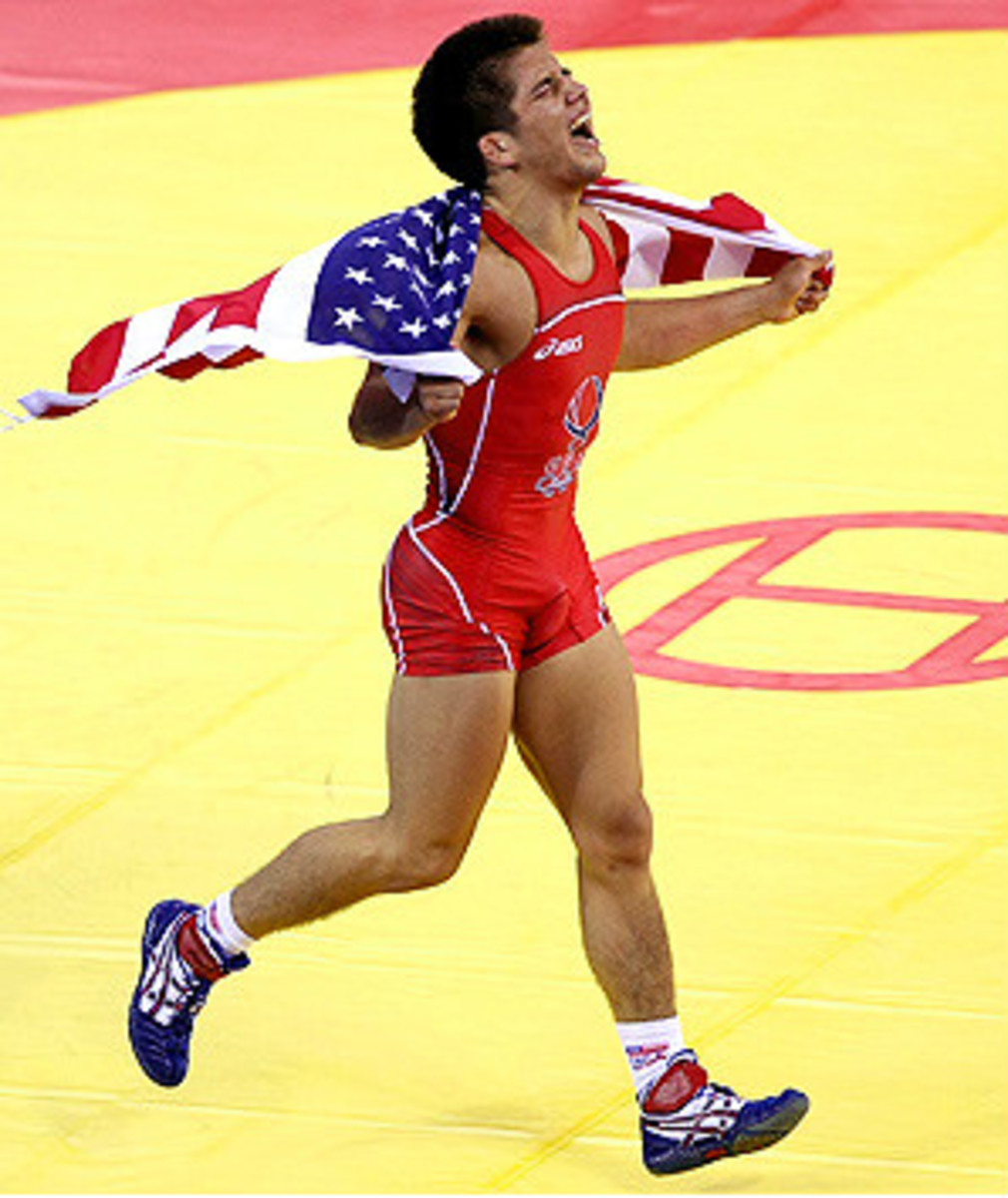Living the Dream Medal Fund pushes wrestlers to stay with sport
Jordan Burroughs is also a two-time NCAA wrestling champion. On September 18 he made $50,000 for winning the freestyle world championships. The gold medal means Burroughs was the best 163-pound wrestler in the world in 2011 and it makes him a favorite to win gold at the 2012 Olympics, but without endorsements Burroughs earned less than one-third of what he could have made as a mediocre UFC fighter in 2011.
"I knew I wasn't going to be a millionaire by wrestling," Burroughs said.
However, if Burroughs wins an Olympic medal in 2012, he'll be one of the highest paid athletes in the United States. The Living the Dream Medal Fund, the nonprofit program that gave Burroughs $50,000 for winning a gold medal at the 2011 world championships, will make wrestlers the highest paid American medalists at the 2012 Olympics. Olympic gold medalists in freestyle, Greco-Roman and women's wrestling will earn $250,000, silver medalists will receive $50,000 and bronze medalists will get $25,000.
The program was founded by Mike Novogratz and David Barry, both former NCAA wrestlers turned businessmen, to encourage world-class wrestlers like Burroughs to stay involved in the sport of wrestling for a longer period of time. A U.S. wrestler has not won multiple Olympic gold medals since John Smith won his second in 1992. In 2004 Cael Sanderson won Olympic gold at age 25, but then turned to collegiate coaching and did not compete at the 2008 Games. He admits that the Living the Dream Medal Fund may have been enough to convince him to put off his coaching career for another four years.
"I think [wrestling with the Living the Dream Medal Fund] would have been a strong option," said Sanderson, who placed fifth at the 2011 World Championships. "As a competitor you're always wondering about competing again."
The program may have come just in time to keep the 2008 Olympic gold medalist Henry Cejudo involved in the sport of wrestling. Cejudo says he was one week away from signing with the Bellator Fighting Championships, a mixed martial arts promotion, when USA Wrestling approached him about a comeback. Cejudo did not explicitly say he was wrestling for the money, but he did say if the fund had existed in 2008 he probably would have retired from wrestling permanently after winning the large Olympic purse.
"I don't know if I'd be wrestling," said Cejudo, who would like to pursue a career as a motivational speaker after the 2012 Olympics. "There's so much more to life than headlocks and double legs."
Most wrestlers acknowledge that putting money into the U.S. wrestling program is a step in the right direction. America competes with countries like Azerbaijan and Russia, which pay all of their wrestling athletes similarly to how professional basketball or football players are paid in the United States. But the Living the Dream Medal Fund has faced criticism for only rewarding athletes who have already shown they can win medals on the international stage. Some wrestlers say they need the money to supplement their training to get to that point -- various stipends from Regional Olympic Training Centers, local wrestling clubs and USA Wrestling already provide to select top wrestlers.
"[Wrestlers] need the money now and they need the money later," Barry, one of the co-founders, acknowledged.
Barry pointed out that from a financial standpoint, the Living the Dream Medal Fund setup makes sense. It provides an incentive for athletes to pursue their Olympic dreams, but only compensates wrestlers who are successful. Individuals who donate to the program can identify with the athletes who win medals and literally see where their money went when a Jordan Burroughs or Jake Herbert (silver medal at 2010 worlds) is presented with a giant check.
The organization also only has to put up a large amount of money if the U.S. has a successful Olympic Games. More medalists are good for USA Wrestling publicity and therefore worth the additional cost to Living the Dream Medal Fund's financial stewards, who provide the chunk of the prize money that donations cannot cover. If enough money is fundraised, the Living the Dream Medal Fund has the potential to pay wrestlers for years to come.
"I'm pretty certain if we get that done and win a bunch of medals and have the stewards only take a little bit of hit they'll all sign up to do it again and then ideally this will be a perpetual fund," said Novogratz, who called the stewards "an insurance policy."
Even though wrestlers who medal will be the highest paid American athletes at the 2012 Summer Olympics, international wrestling is still not as lucrative as Mixed Martial Arts. Burroughs, Herbert, Sanderson and Cejudo all pointed out that they compete because they love the sport. An average UFC fighter like Hendricks earns a steady annual paycheck while only world class wrestlers are rewarded financially. Herbert pointed out that the $25,000 he was given by the Living the Dream Medal Fund in 2010 for a world silver medal could have been earned with a lot less training if he worked at Subway full time.
"If I wanted to make money I'd use my Northwestern degree," said Herbert, who holds a Master in Sports Administration and a Bachelor's in Communication. "I wrestle because I love it."





